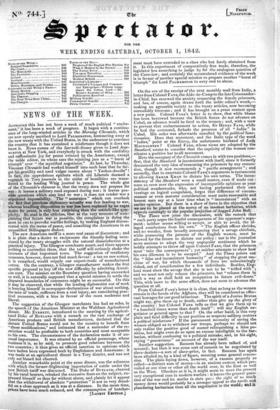NEWS OF THE WEEK.
ALTHOUGH this has not been a week of much political " excite- ment," it has been a week of progress. It began with a continu- ance of the long-winded articles in the Morning Chronicle, which are now openly ascribed to Lord PALMERSTON, hammering away at the new treaty with the United States, in the endeavour to convince
the country that it has sustained a misfortune though it does not
know it. News coma .of the farewell-dinner given to Lord ASH- BURTON at New York, and everybody is struck with the cordiality
and enthusiastic joy for peace evinced by the Americans; except the noble editor, on whose ears the rejoicing jars as a " burst of triumph" over "the mystified negotiator." At last, by Thursday,
Viscount Chronicle had worked himself into such heat that he for-
got his gentility and used vulgar taunts about " Yankee-doodle" ! In fact, the opprobrious epithets which old Liberals deemed a reproach to Tory journals in the midst of hostilities are trans-
ferred to the leading Whig journal in peace. The whole gist of the Chronicle's clamour is, that the treaty does not prepare for
war : it leaves a military road exposed during war ; it leaves pos- sible questions which may lead to war ; it does not render war a stipulated impossibility. The " assurance" which can overlook the fact that previous diplomacy actually was fast leading to war, whereas headlong disposition to war has been replaced by an eager desire for peace, is only less surprising than the ostrich-like s,ym- plicity, So mad is the oblivion, that at the very moment of com- plaining that future war is possible, the complainer is doing the most he can to provoke warlike feelings, by making England discon- tented with the terms of peace, and assaulting the Americans in an unqualified Billingsgate dialect.
The new American tariff is a more real cause of discontent ; and it is plain that a desire to reciprocate the friendly feeling occa- sioned. by the treaty struggles with the natural dissatisfaction at a practical injury. The Glasgow merchants assert, and there appears nothing to contradict them, that the tariff will seriously shake the interests of that important town. The suggestion of retaliatory measures, however, does not find much favour : a tax on raw cotton, it is remarked, would cripple our export-trade of manufactured cotton. On the contrary, a Glasgow manufacturer makes the first specific proposal to buy off the new difficulty by admitting Ameri- can corn. The mission on the Boundary question having succeeded so well, it is naturally supposed that a special mission to settle the disputed boundaries of commerce might be as successful. On this it may be observed, that while the leading diplomatist out of work IS busying himself in newspaper-declarations of war about nothing, the men of trade, sufferers from a real injury, are Considering prac- tical measures, with a bias in favour of the most moderate and liberal.
The suggestion of the Glasgow merchants has had an echo, in the speech cf the American Minister at the Waltham Agricultural dinner. Mr. EvEsErr, introduced to the meeting by the agricul- tural Duke of RUTLAND with a remark on the vast exchange of American produce and British manufactures, declared that the distant United States would not be the country to benefit from "these modifications," and intimated that a surrender of the re- striction would be profitable to both countries and most acceptable to his own. The circumstances of the declaration make it of un- usual importance. It was uttered by an official personage, whose business it is, as he ,said, to promote good relations between the two countries; it thus gives an official sanction to opinions which have before been expressed both by Englishmen and Americans : it was made at an agricultural dinner in a Tory district, and was not only not hissed but cheered.
Another remarkable point at the same dinner, was the calmness with which the farmer-frightening importation of cattle under the new British tariff was discussed. The Duke of RUTLAND, cheered by his rural hearers, rebuked the excessive fears on the subject, ex- pressed himself as thus far without alarm, and plainly let it appear that the withdrawal of absolute " protection " is not so very dread- ful on a close approach as it was at a distance. In the mean time, Prices have been much reduced, and the consumption of butcher- meat must have extended to a class who but lately abstained from it. In this experiment of comparatively free trade, therefore, the legislator has something to judge by for the analogous question of the Corn-law; and certainly the accumulated evidence of the week is in favour of another special mission to prepare another "burst of triumph" for Lord PA LM ERSTON to envy and to abuse.


























